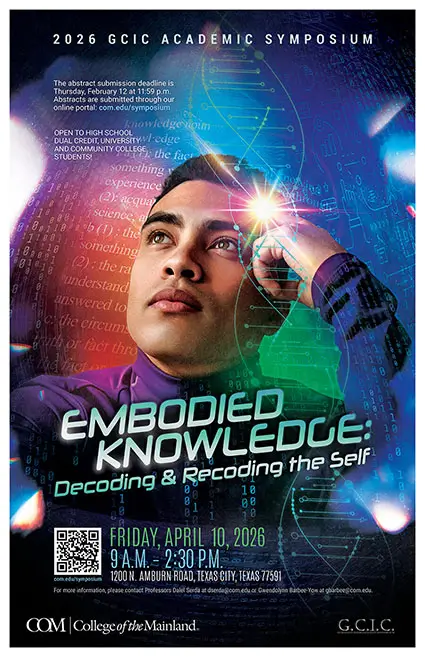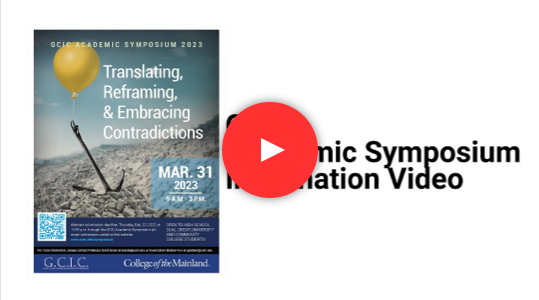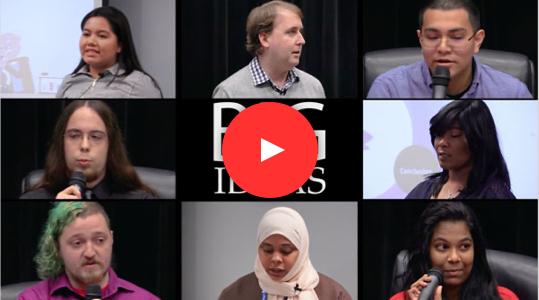
2026 GCIC Academic Symposium
Embodied Knowledge: Decoding and Recoding the Self
Friday, April 10, 2026
9 a.m. - 2:30 p.m.
1200 N. Amburn Road, Texas City, Texas 77591
Abstract Submission Deadline:
Thursday, Feb. 12, 2026 at 11:59 p.m.
2026 Theme Details
Humans like to know. Whether we want to honor knowledge or own it, we desire to recognize, believe, understand, name, domesticate, and dominate.
Often, we must know, to be “in the know.” We feel secure in knowing. We can do things with knowledge and very little in its absence—unless, of course, we count the bliss that can come with ignorance as worth our time. Ah. There’s the rub. There is the conundrum. …Do we really enjoy knowing? Is that what we seek? Do we trade almost anything for knowledge, or is it really the exact opposite? Are we happier in the space where knowledge is absent and where what remains is (simple… easy!) gratification and pleasure? Does the body seek knowledge and truth or the easy caresses of corporal, psychological, and emotional seduction? Does the body know when the mind fails? Does the body carry with it genetic and generational knowledge in code that falls outside human linguistic systems?
Yet here we all are—tangled by choice, need, or will in higher education where we see it as our quest to know, to be the knowers on whom others and the world rely. The question of how we know or why we know is at the center of our human motivation and inspiration, we claim. To think is to know! To embody is to know! To experience is to know! To believe is to know! To see, hear, taste, feel, smell is to know! All of it, some of it, and none of it is valid—we claim at one time or another.
Who gets to claim the validity of truth and the truth of knowledge? Why do they get to? How can we challenge hegemonic domination when it dictates what knowledge and truth are? How can we share in truth making, in knowing, and in being?
To live in knowledge means to throw out nothing, to hesitate before privileging one way of knowing above another, to have a tenuous relationship with “absolute truth,” to walk toward the middle ways, to invite difference into our walk toward knowing because it’s in difference where nuance, depth, complexity and beauty astonish.
This year’s theme, “Embodied Knowledge: Decoding and Recoding the Self,” asks us to consider the body as archive. To consider what the body helps us know when other elements are of no or little assistance. We ask too what the body tells us that complements other knowledges and ways of being.
Consequently, we want to ask you to consider what it might mean to “decode” and “recode” the self. How do we do this? How do education, analysis, examination, experimentation, experience, and research help define decoding and recoding?
We ask too that we reconsider not only what we mean by “knowledge” but what we mean by “embodiment” and the body. What makes a body? Who makes a body? What does it mean to be a part of a body politic? How do we expand the borders of a body without sacrificing integrity but rather by incorporating abundance?
Here are a few questions that can help extend your thinking but feel free to develop your own:
What can the hard sciences, human and behavioral sciences, the humanities, the fine arts, and workforce tell us about the body, a body, embodiment, knowledge, and coding?
What are the benefits and challenges of embodied knowledge? What are the benefits and challenges of naming a knowledge, embodying a knowledge, and/or de/recoding it?
This year’s theme is broad and lends itself to cross-disciplinary examination, which is the driving force of our academic symposium.
Our intention is to enable students and their supporters to think more deeply than we’re able to in the classroom while sharing in formal and less formal networking opportunities.
How to Start
We invite you to contact Professor Dalel Serda (dserda@com.edu) and/or Professor Gwendolynn Barbee-Yow (gbarbee@com.edu) if you want elaboration on possibilities. Please submit 150 to 250-word abstracts through our abstract submission link by Thursday, February 12, 2026 at 11:59 pm.
Please follow the abstract protocols and conventions of the subject/discipline (i.e., STEM, humanities, fine arts, social science, workforce) you select. For specifics, please ask a professor who may serve as an advisor or mentor for your project or contact us directly. This event is free and open to the public.
Important: Once you submit your abstract, we will review it and accept or reject your project by a week after the abstract submission deadline. If you are accepted, we expect you to prepare a 10- to 12-minute presentation. Please prepare a visual aid, save it on a flashdrive, and bring it with you to the symposium. You will hand the flashdrive to our student helper before your scheduled presentation session begins. We will not have the means to connect your laptop nor will there be time to search email for your visual aid. Please follow the above protocol.
Note: You do not need an advisor or mentor to submit an abstract for a project presentation. You may work alone as an independent scholar. This event is free and open to regional high school, community college, and undergraduate university students. Please limit your abstract submissions to two per person.
Additional note: Work to offer your audience an argument and support it with evidence. Ideally, your work—whatever the subject—is contextualized in a researched conversation. Bring something new to an existing discussion or area. Make your argument clear and connect your presentation to the theme in some way.
Student Presentation Examples
Related Academic Symposium Videos
Have Questions? Contact Us
Please feel free to contact us with any questions or comments.
Dalel Serda
Professor of English | GCIC Academic Symposium Co-Chair
409-933-8497
dserda@com.edu
Gwendolynn Barbee-Yow
Assistant Professor of English | GCIC Academic Symposium Co-Chair
409-933-8776
gbarbee@com.edu


